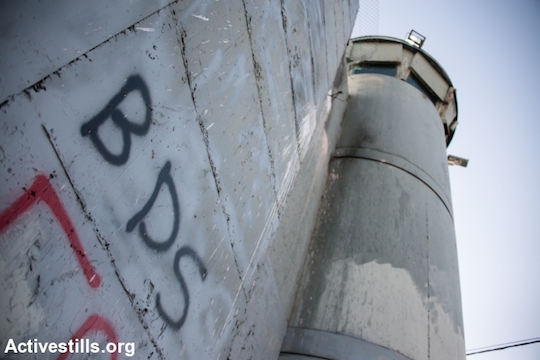Congress uses U.S. trade policy to undercut European pressure against Israeli settlements. A new U.S. bill legitimizes Israeli settlements and delegitimizes Palestinian non-violent resistance to the occupation.

The United States Congress is about to pass a law that erases the Green Line and delegitimizes one of the most effective non-violent tools Palestinians have for fighting the 48-year-old Israeli occupation.
The Trade Facilitation and Trade Enforcement Act legally authorizes the White House to negotiate and sign trade deals. An amendment in that bill now defines Washington’s principal objectives in those negotiations to include the discouragement of boycott, divestment and sanctions moves against Israel, including non-tariff barriers on Israeli goods, services or commerce.
The bill defines such boycott, divestment and sanctions actions as any actions “that are politically motivated and are intended to penalize or otherwise limit commercial relations specifically with Israel or persons doing business in Israel or in Israeli-controlled territories.”
The key term here is, “or in Israeli-controlled territories.” That term is specifically used in Israel to refer the Israeli presence in the West Bank, including the settlements. To put it simply, Congress is saying that as far as it is concerned, there is no difference between Tel Aviv and the West Bank settlement of Kiryat Arba.
Another point of immense importance is the inclusion along with BDS, “politically motivated non-tariff barriers.” Because the amendment specifically applies to trade talks with Europe, that wording should be understood as a response to increased efforts by the EU to ensure that its trade agreements and financial relationships with Israel do not cross the Green Line. That means labeling settlement products, limiting financial cooperation and lending to companies that operate in the settlements and the withdrawal of agricultural inspection certificates for Israeli goods produced in the West Bank.
Now the executive branch of the United States will be mandated “to discourage” such measures, which have become an increasingly central tenet of European foreign and economic policy vis-a-vis Israel. The measures are treated seriously because as a bloc, the EU is Israel’s single largest trading partner.

For over a decade the United States has consistently described Israeli settlements in the West Bank as “obstacles to peace,” “unhelpful” and “illegitimate.” In decades past, Washington joined the international consensus that settlements are illegal under international law.
The United States was single-handedly responsible for extracting commitments from late PLO Chairman Yasser Arafat to disavow violent resistance to the occupation, essentially forcing his hand toward a non-violent path. Ultimately, that resulted in the appointment of Arafat’s successor, Mahmoud Abbas, who is fully committed to a non-violent path toward statehood and independence.
The central tenet of that path has been bilateral peace negotiations with Israel. But over the course of the last 20 years, as the peace process sputtered and eventually fell into a vegetative state, the Palestinian government has expanded its non-violent arsenal. Its most threatening tool is actually a civil society initiative: the boycott, divestment and sanctions movement. (More recently it has taken other steps like joining UN bodies and the International Criminal Court.)
Short of group meditation and the power of positive thinking, there is no tactic more quintessentially non-violent than boycott. Furthermore, boycott epitomizes the free-market foundations of America’s economic and political ideology: it is not only non-violent, it is also democratic. Ideally, consumers choose with whom they wish to do business, and in doing so, encourage the adoption of their political beliefs and values.
But even more compelling, the boycott movement is largely credited with bringing down the closest known political system to the Israeli occupation: South Africa’s apartheid regime. BDS has a pretty strong track record for affecting political change.

The Israeli government knows how effective boycott, divestment and sanctions could be in forcing it to recalculate its interests vis-a-vis the 48-year-old military occupation. Israeli leaders have understood for decades that the world will no longer accept its occupation and denial of rights to an entire nation of people under its control.
The perpetuation of the peace process bought Israel a 20-year grace period from feeling the international consequences of the now-permanent occupation. But particularly with the re-election of a prime minister who has all but ruled out a two-state solution, most analysts expect the pressure to soon be ratcheted up a few notches, and that will likely come first from Europe.
Two weeks ago the Israeli High Court handed down a symbolic affirmation of efforts to counter the Boycott, Divestment and Sanctions movement. However, the court, which was asked to rule on the constitutionality of anti-boycott legislation, largely de-fanged the law and the ability to effectively use it as a counter-measure to boycott efforts.
Now, the United States is picking up where the Israeli Supreme Court left off. Determined and intransigent as its settlement policies may be, Israel has no way of actually stopping the rising tide of economic pressure heading east along the Mediterranean. The United States, however, is the only world power still willing to waste its soft power on sheltering Israel from the inevitable storm.

Despite its intentions, however, it is not clear exactly to what extent the Trade Facilitation and Trade Enforcement Act will succeed in influencing U.S.-EU trade agreements, and eventually, EU trade policy with Israel.
What is clear is that American liberal Zionist groups attempting to lobby for a change in U.S. policy vis-a-vis Israel’s occupation are up against something far more powerful than most are willing to admit.
If, as many believe, international pressure is necessary for ending the occupation, it is almost certainly not going to come from Washington. Regardless of what Obama chooses to do — or abstain from doing — in his final two years in office, the United States’ unquestioning support of Israel’s occupation is only becoming more entrenched.

